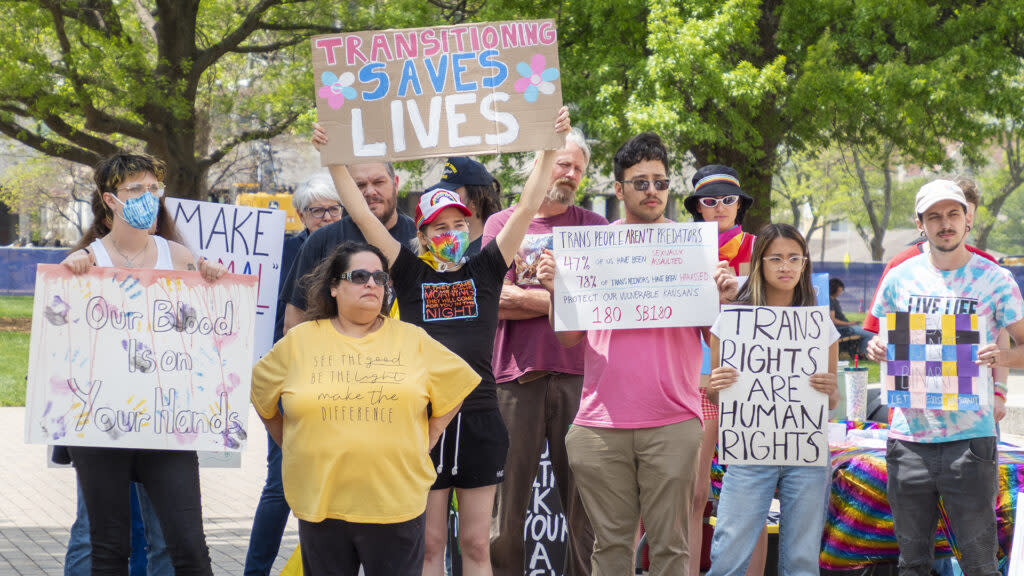Lawmakers’ rejection of gender-affirming care ban protects Kansas patients and providers

- Oops!Something went wrong.Please try again later.
Kansans rally in support of transgender rights May 5, 2023, at the Statehouse in Topeka. (Sherman Smith/Kansas Reflector)
In late March, the Kansas Legislature passed Senate Bill 233, nicknamed the Forbidding Abusive Child Transitions Act, and sent it to Gov. Laura Kelly for her signature. I watched the testimony regarding this bill and saw family after family and multiple medical experts from our own state explaining to the lawmakers how curtailing — even banning — needed medical care would adversely affect our transgender youths, who are already a vulnerable group facing depression and bullying.
I witnessed the proponents who testified in favor of the bill presenting debunked data about the likelihood of regret after transition. They were invariably from out of state — activists who testify across the country in favor of “cookie cutter” laws discriminating against gender-affirming care in multiple states.
Kelly vetoed the bill April 25 and returned to the House and Senate for override votes on April 29. The veto was overturned in the Senate but narrowly sustained in the House, after much discussion and consideration. I saw parts of this discussion also, including impassioned pleas to think of the mental health of these children and to allow their parents, with the advice of physicians and therapists, to make their own health care decisions without government interference.
The bill targeted gender-affirming care practitioners’ licenses to practice medicine and malpractice insurance, and exposed them to civil prosecution until the patient turns 28 years old.
This applied to medical treatment such as puberty blockers and hormones to treat gender dysphoria, even though none of these approaches cause significant concern and all would be accompanied by appropriate informed consent for the parents and the patient. Making the bill even worse, it also restricted state employees’ ability to support “social transitioning” (manner of dress, chosen name, chosen pronouns) and mental health care for trans kids.
Though transition surgery was included in the proposed ban, it has been confirmed that Kansas medical centers do not perform gender reassignment surgery on minors. The bill would have left the Kansas health care facilities open to legal action, as well as shutting down clinics and physicians providing care to at-risk kids throughout the state.
In my opinion as a practicing high risk obstetrician caring for trans patients, the veto was the proper response.
One might think the story stops there, but I want to bring to light the postscript to that House vote for Kansas Reflector readers.
You may or may not be aware that trans men and trans women in our state face discrimination to the point of threats to their lives, families, and property. Now, these threats are spilling over to state representatives who voted against overturning the veto, keeping this overreaching and cruel bill from becoming law. It’s no coincidence that the anti-trans group “Libs of TikTok” has highlighted lawmakers who crossed party lines to support the veto.
These lawmakers receive messages and emails accusing them of being sick, evil and despicable. If they feel threatened by messages received over the past week or two, imagine how our trans kids and their families feel every single day.
I believe that as physicians it is our duty to treat our patients with the highest quality of medical care, and as non-physicians, I prefer that legislators do not practice medicine and interfere with counseling and treatment by compassionate experts. I also believe that our legislators should not be subjected to threats for listening to their constituents and voting with their conscience to block an overly broad, intrusive and dangerous bill.
Elizabeth Wickstrom is a maternal fetal medicine specialist who lives in Prairie Village. Through its opinion section, Kansas Reflector works to amplify the voices of people who are affected by public policies or excluded from public debate. Find information, including how to submit your own commentary, here.
The post Lawmakers’ rejection of gender-affirming care ban protects Kansas patients and providers appeared first on Kansas Reflector.

